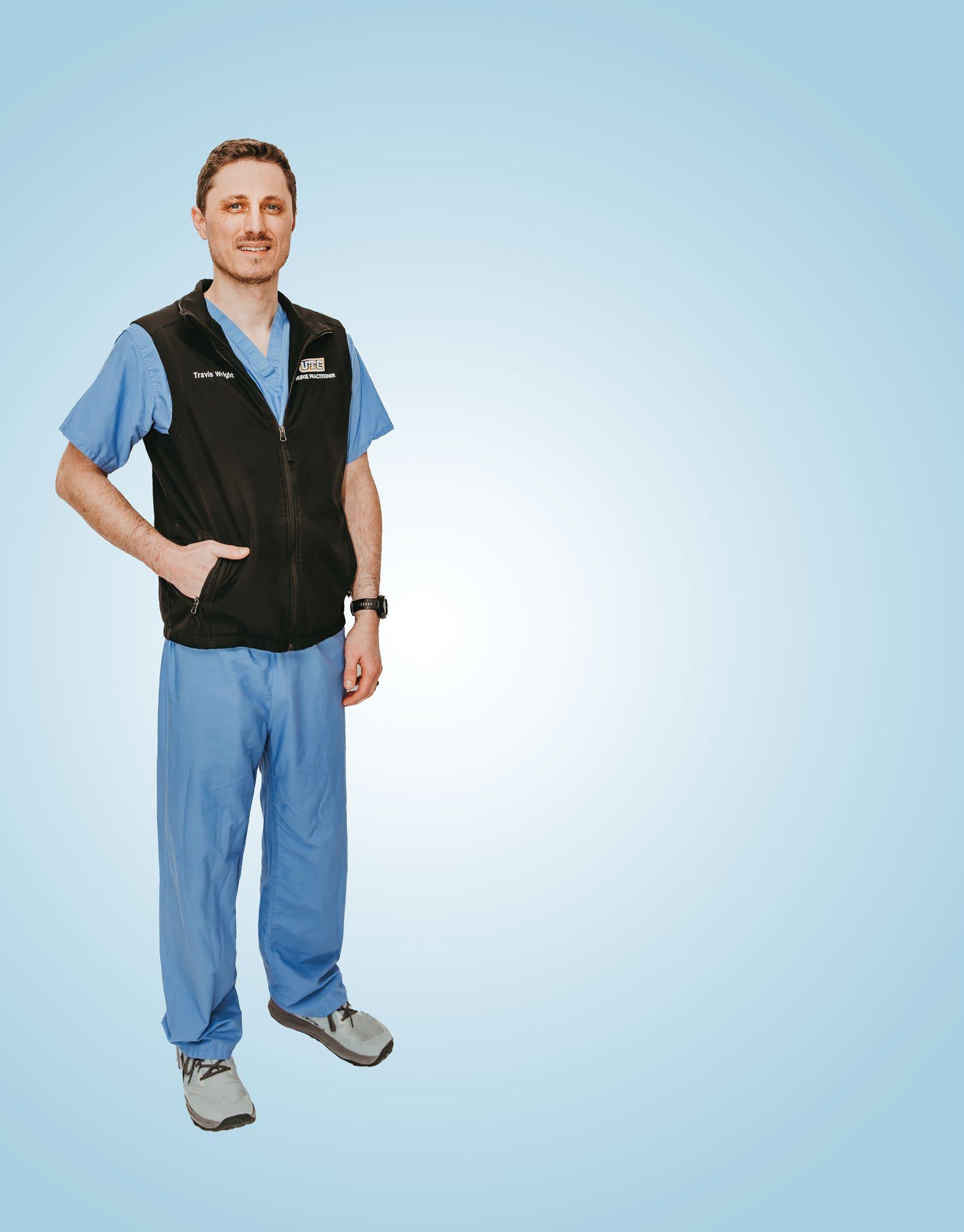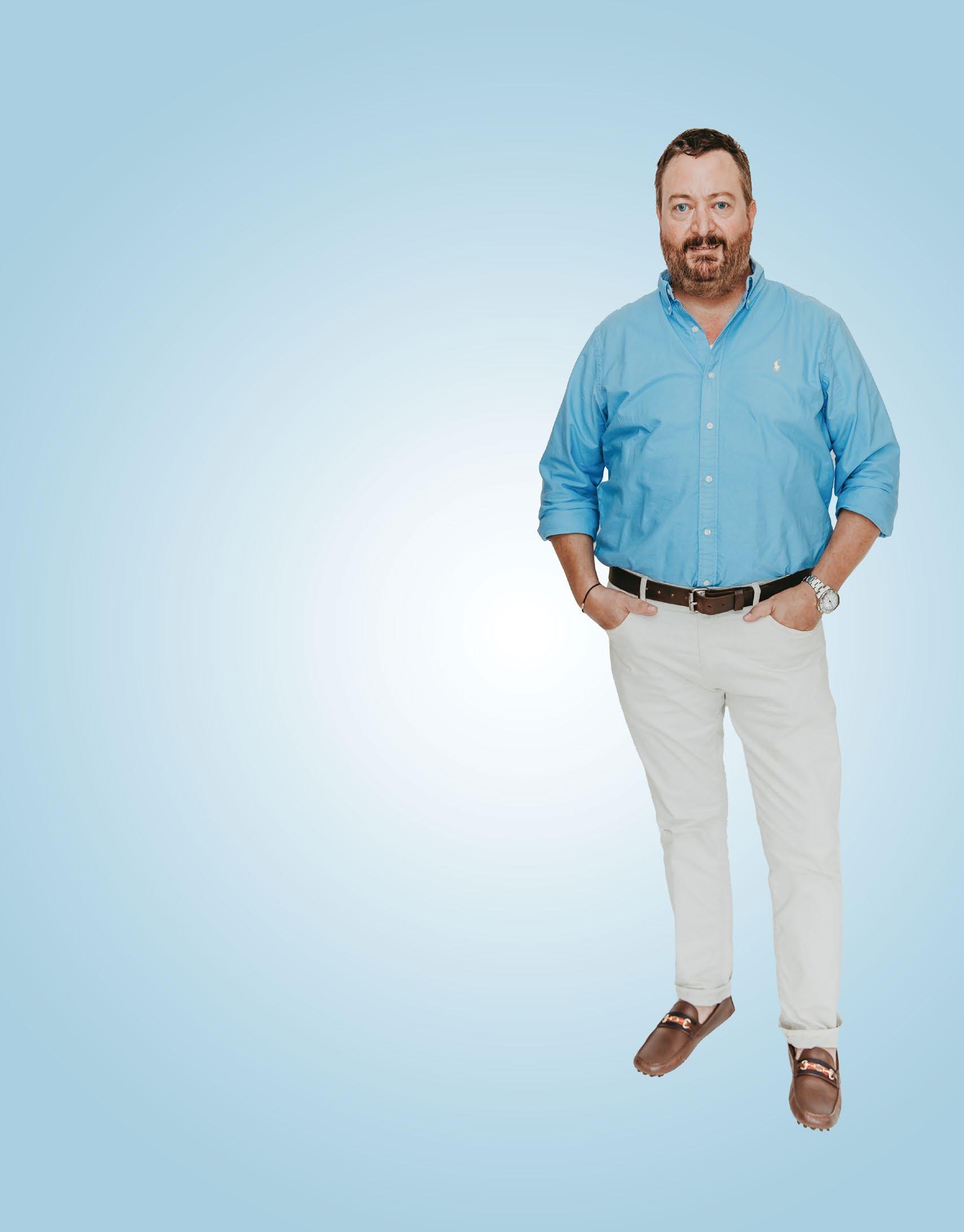
8 minute read
Answering the Call Graduate Students Pursuing a Passion for Healthcare
Answering the Call
GRADUATE STUDENTS PURSUING A PASSION FOR HEALTHCARE

Acareer in healthcare requires perseverance, compassion, and a commitment to serving others. From the long hours of nursing and medical school to the high-stakes responsibilities of patient care, every step requires more than just knowledge – it requires heart. Behind every future nurse or doctor is a story of resilience and a deep-rooted passion for making a difference. We sat down with four of our region’s most driven nursing and medical students to uncover what fuels their journey, the obstacles they’ve overcome, the support systems that helped them rise, and the unwavering sense of purpose guiding their paths.
By Lindsey Clute and Rachel Studebaker
Photography by Kristina Armstrong

Travis Wright
UNIVERSITY OF TENNESSEE AT CHATTANOOGA
Doctor of Nursing Practice –Adult-Gerontology Acute Care (AG-ACNP)
With a passion for science and a drive to help people achieve their goals, Travis Wright decided to take his nursing career to the next level by pursuing a Doctor of Nursing Practice in AdultGerontology Acute Care. Now in his third year at the University of Tennessee at Chattanooga, he’s found purpose and inspiration at every step, thanks in large part to the mentors who helped shape him along the way.
“I have been able to learn from some of the smartest, most knowledgeable practitioners,” Wright says. “Our instructors are passionate about what they do, and I hope to carry that passion with me into my practice. Additionally, our program director, Dr. Denton, is one of the most knowledgeable people I know and someone I would trust with my life. She is the practitioner I aspire to be.”
But Wright’s path to medicine didn’t begin in a classroom or clinic. Before ever donning scrubs, he spent 10 years working as a motorcycle mechanic, a career that, unexpectedly, held important parallels to the medical field. “It taught me a lot about thinking through problems to get to the root issue,” Wright shares, “but more importantly, it taught me that whatever you’re working on is part of a larger system. You have to approach things holistically and treat the entire machine if you want it to run well.”
As a full-time student, husband, and father, Wright’s journey hasn’t been straightforward. However, a desire to serve others at their most vulnerable ultimately solidified his pursuit. “I love critical care. It’s fast-paced, challenging, and is essentially a continuous stream of controlled chaos. It’s often not easy, but helping people go from being critically ill to being able to go back to their lives and hobbies is incredibly rewarding.”
For Wright, caring for patients goes far beyond the immediate bedside. It’s also about empowering people to take ownership of their health and finding ways to continually improve the care he provides. “Adding new tools to my toolbox and using the latest evidence to improve my care is exciting to me,” he says. “I want to continue to grow for as long as I’m practicing.”

John P. Smith
SOUTHERN ADVENTIST UNIVERSITY
Doctor of Nursing Practice –Psychiatric-Mental Health (PMHNP-DNP)
From growing up on a farm to serving as captain and company commander of his high school’s ROTC program, John Smith learned the value of discipline, empathy, leadership, and work ethic from an early age. Now a third-year Doctor of Nursing Practice student at Southern Adventist University, Smith brings that same foundation into his work as an aspiring psychiatricmental health nurse practitioner.
“Early on, I recognized that health is deeply intertwined with a person’s environment, resources, and mental well-being, not just their physical symptoms,” he shares. “This led me to the field of psychiatric-mental health nursing, where I felt I could genuinely make a difference by listening, advocating, and walking alongside individuals during their most vulnerable moments.”
That passion for people, especially those often underserved or overlooked, became the heartbeat of Smith’s career goals. But his journey hasn’t been without hardship. After losing his mother to stomach cancer, Smith was left to navigate grief while juggling academic demands. Still, he persevered. “Despite the struggles, or maybe because of them, I’ve become more committed than ever to this path,” he says. “I know what it means to endure loss, carry on, and still choose to care – and that, I believe, is at the heart of nursing.”
Smith now channels that resilience into his vision for the future: one where healing goes far beyond symptom management. “I want to create safe, nonjudgmental spaces where patients feel seen, heard, and empowered,” he explains. “Healing happens in relationships through empathy, education, and empowerment.”
He’s also passionate about supporting those behind the scenes – his fellow healthcare providers. “Mental health among providers is too often neglected,” he says. “Through initiatives like workshops and burnout prevention, I hope to create healthier systems that support both patients and professionals.”
Whether he’s mentoring future nurses, advocating for equitable care, or offering hope to someone in crisis, Smith is driven by the core belief that every person deserves to feel they matter. “If I can be a steady presence in someone’s journey toward healing,” he says, “then I’ll know I’ve done something meaningful.”

Alia Parker
LEE UNIVERSITY
Doctor of Nursing Practice –Family Nurse Practitioner (DNP-FNP)
For Alia Parker, a career in nursing is about providing hope and holistic healing to her patients. She has had plenty of experience doing just that in her healthcare career, holding positions from an EKG tech and patient care technician to working in the ER, ICU, and travel nursing. Currently pursuing a Doctor of Nursing Practice at Lee University, Parker is eager to put her degree and broad experience to use as a new nurse practitioner.
Parker describes the knowledge that she and other practitioners gain from their studies as a “toolbox,” adding, “From it, we can draw many different resources to help our patients achieve better health and reach their personal goals.” She plans to put her toolbox to use in the field of functional and integrative health, looking at the mental and spiritual, as well as physical, components of well-being.
However, acquiring these tools doesn’t come without hard work. “Entering graduate school is very much like committing to a long-term relationship – one that requires loyalty, sacrifice, and endurance,” describes Parker. Despite the challenges of juggling graduate studies with daily demands and raising three sons, Parker has persevered in pursuit of her passion and says the support from her husband has been invaluable.
To those entering graduate school, Parker says to take it day by day. “This journey is a marathon, not a sprint,” she advises. “Pace yourself, and adopt a mindset rooted in hope – knowing that you will reach the finish line by taking it one mile at a time.”
“I have always been deeply grateful for becoming a nurse,” concludes Parker. “I am especially thankful to my family, who has supported me every step of the way as I’ve grown into the person I believe God created me to be.
I’m also incredibly grateful to Lee University and the professors there for providing such an excellent environment to learn, grow, and be shaped both professionally and personally… I truly believe it has made me a better person, a better leader, a better nurse, and a better provider.”

Alvaro Cortez
DALTON STATE COLLEGE
Doctor of Medicine (MD) and Master of Public Health (MPH)
Equipped with a bachelor’s degree in biology from Dalton State College, Alvaro Cortez is taking the knowledge and lessons he learned as an undergraduate with him into the Doctor of Medicine and Master of Public Health dual-degree program at the Medical College of Georgia. Fueled by a longstanding dream and steadfast passion for family medicine, Cortez is nearing the finish line of a path he’s walked with heart and grit.
“I love the ability to form long-term relationships with patients and address broad needs,” explains Cortez. “Having a good primary care doctor keeps the community healthy and ensures that patients receive comprehensive care.”
For Cortez, the choice to enter the medical field stemmed from a deeply personal place. “I was inspired to pursue a career in medicine when my sister was born with trisomy 18, also known as Edwards’ Syndrome,” says Cortez. “Watching my Mexican immigrant parents navigate my sister’s health needs showed me that the Hispanic/ Latino population faces many barriers to healthcare. I realized that there is a great need for Hispanic/Latino physicians, which has ultimately shaped my career aspirations.”
His adversity didn’t stop there. As a first-generation college and medical student, Cortez has had to push boundaries, relying on resilience and determination. “I’ve had to navigate many aspects of this journey without a roadmap,” he says. “That challenge has made me more resourceful, disciplined, and empathetic. It’s also deepened my commitment to mentoring others who are walking similar paths and may be facing similar doubts or barriers.”
Although he faced many challenges, he never endured them alone. His parents have been his greatest role models, instilling in him a deep respect for education and diligence. Through their example, he is inspired to encourage others from similar backgrounds to pursue their dreams.
“Don’t be afraid of being uncomfortable,” Cortez says, offering a message of hope to those beginning their medical journey. “There will be moments when you feel unprepared, overwhelmed, or unsure of yourself. That’s okay. Lean into those moments and trust that they are shaping you into the physician your patients need. You are more capable than you know, and every challenge is an opportunity to grow into the doctor you’ve always dreamed of becoming.”

